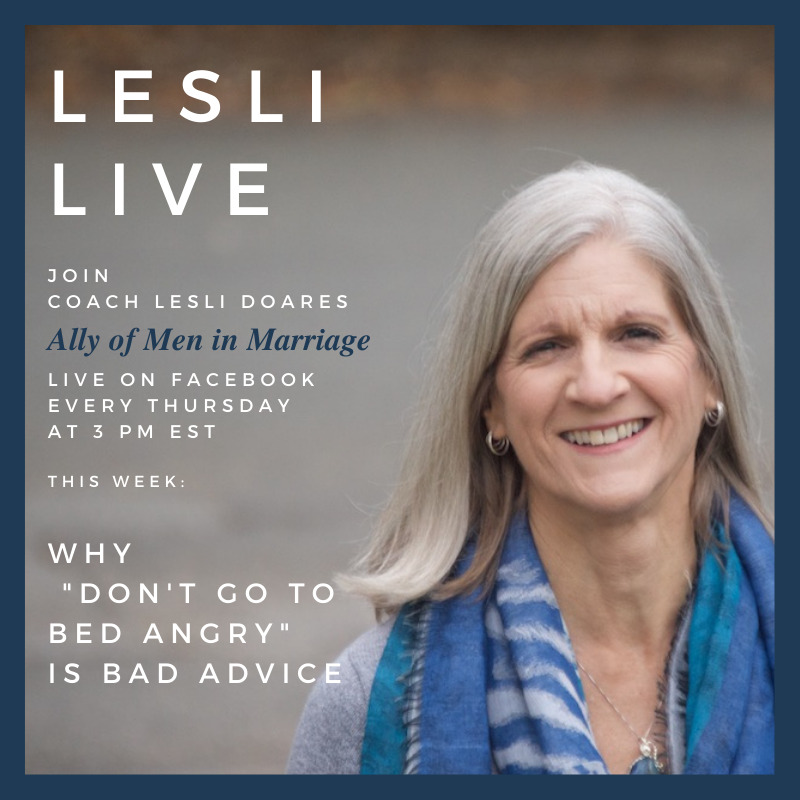The way most people interpret this is to go ahead and hash it out with your partner. Then you’ll be able to go to sleep. If you’ve tried that, I have a question—How’s that working for you?
If you’re like most people, it only makes the situation worse. Why? Because not only are you angry, but you are tired too. This makes it less likely that you will reach a satisfactory solution. When you’re tired it’s harder to think clearly. It’s harder to listen. It’s harder to not get defensive. It’s harder not to say hurtful things. It’s just plain harder.
Which is why one of my cardinal rules is: Never begin a serious conversation after 8 pm.
You’re just asking for trouble. (And most often, you will get it.)
Bad Marriage Advice #10: If You’re Not Happy in Your Marriage, You Should Leave
Many fairy tales end “and they lived happily ever after”. But marriage is not a fairy tale. In the early days of your relationship, you probably spent more happy times together than not. Otherwise, why get married? So it can come as a shock when you realize that you...
Bad Marriage Advice #9: Marriage is 50/50
Marriage is 50/50. You do your half. She does hers. And together you’ll get a complete marriage. Sounds good right? Except it doesn’t really work that way. Instead of getting a 100% marriage, you’ll end up with a partial one where neither of you is fully living up to...
Bad Marriage Advice #8: Marriage Requires Sacrifice
What do you think of when you hear the word “sacrifice”? Does it sound easy or difficult? And should it be a required part of marriage? Not in my book. Because marriage is not a deity or supernatural blob that needs to be appeased. Sacrifice is defined by Merriam...
Getting your anger under control is a desirable goal. Trying to fall asleep when you’re upset is pretty much impossible. But the answer isn’t to hash things out. It’s to deal with your emotional state.
So instead of focusing on your partner or even the incident that set you off, find a productive way to calm yourself down.
First, write down what triggered you. Be as specific as you can. Write it as if you are narrating a movie—who was present, what actions each person took, what words were said, etc. Then write down the story you told yourself about your partner and the feelings you have as a result. Then breathe. Deeply and slowly.
If you’re still upset, then do something that will engage your thoughts and/or your body. Read a story. Listen to music. Watch a show. Go for a walk. Fold the laundry. Choose an activity that will settle you down so no getting on social media or anything else that will feed your anger.
You aren’t in control of your initial emotional reaction. But you can choose to either feed or starve that emotion. Engaging with your partner when both of you are tired will tend to feed it. This just piles on to the initial disconnection and makes things worse.
Choosing not to address a hard emotion at the moment you are feeling it is not inauthentic. It’s good relational behavior. You can and should bring it up when you are both in a position to give it the time and attention it needs.
In the calm light of day, it may not seem as important. But, if it does, you’ll both be in a better place to deal with it in a way that supports instead of damages your marriage.
If you struggle with managing your emotions or if you and your partner can’t discuss hard stuff without arguing, I invite you to have a conversation with me about how to do this more effectively.
Around the Web This Week

Why “Don’t Go to Bed Angry” is Bad Marriage Advice
While it sounds good AND it is hard to go to sleep when you’re upset, continuing a contentious conversation into the wee hours is not good for your marriage.








